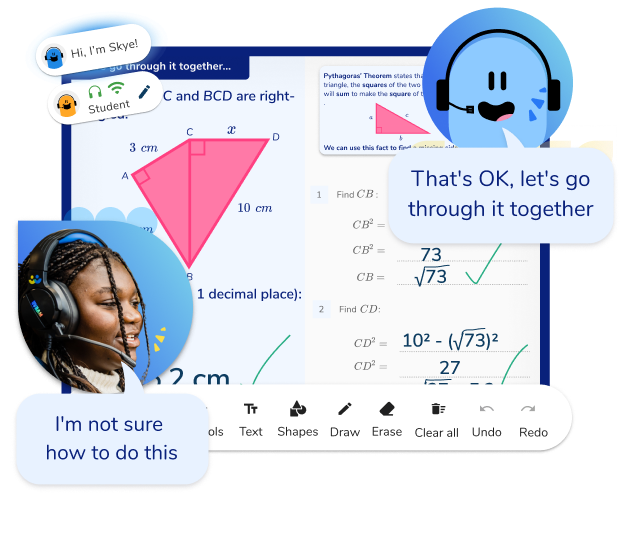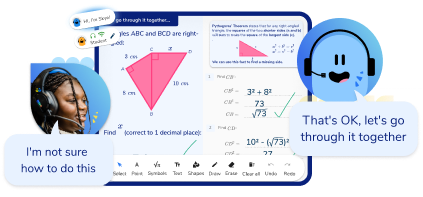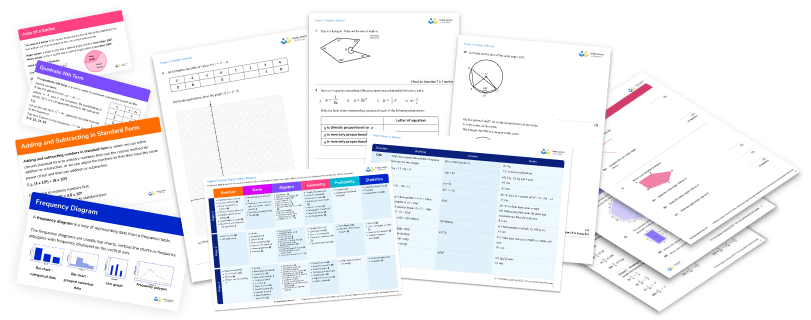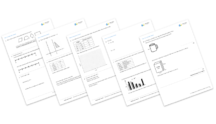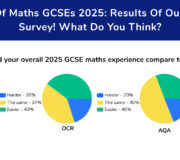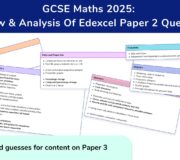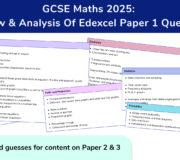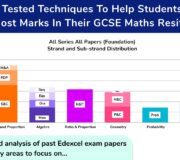How To Revise For GCSE: What Your Students Need To Know To Achieve Their Target Grade
Knowing how to revise for GCSE is not easy and too often teachers will just say “make sure you revise for your exam next week!” without teaching the necessary revision skills.
When I started teaching, yelling this as the students rushed out of the door was about as far as I went with revision tips. I somehow expected that they’d just know how to revise. It didn’t take me long to realise that lots of students really struggle with revision, particularly selecting effective techniques and organising their time.
GCSE MATHS 2025: STAY UP TO DATE
Join our email list to stay up to date with the latest news, revision lists and resources for GCSE maths 2025. We’re analysing each paper during the course of the 2025 GCSEs in order to identify the key topic areas to focus on for your revision.
GCSE dates 2025
GCSE results 2025 (when published)
Analysis of GCSE Maths Paper 1 2025
Analysis of GCSE Maths Paper 2 2025
GCSE Maths Teacher Survey Results 2025
Good exam revision habits should start before Year 11. It’s important that, as educators, we explicitly teach them.
There are a lot of products marketed at sorting revision, but actually, the principles behind effective revision are remarkably close to principles for effective teaching and learning.
Practice Paper Pack: Edexcel Foundation 2023
Download this free pack of GCSE Maths practice papers to help with exam revision.
Download Free Now!In this blog, I highlight some of the most effective revision techniques and give some examples for revising GCSE Maths, basing my suggestions on research and what has worked for me in the classroom. Finally, I give my answers to a few student FAQs for beginning a dialogue with your class about effective GCSE revision.
Before writing this piece, I read a fantastic article called Strengthening the Student Toolbox, by John Dunlosky. He and his team looked at a range of strategies for learning and ranked them in terms of effectiveness. They identified the top two study strategies to boost learning as practice testing and distributed practice.
As an aside, it is worth noting that Dunlosky and his team did not include computer-based learning and tutors in their study, as they wanted to consider strategies available to all students, regardless of access to technology. Dunlosky notes that some computer-based revision programmes also show promise in terms of effective use of study time.
Practice testing as part of GCSE revision
Practice testing is simply testing knowledge or understanding in a low-stakes way, including things like completing past exam papers, using flashcards, or summarising key information. Dunlosky mentions three key principles:
- Recalling from memory as opposed to choosing from multiple choice answers;
- Making notes in such a way to support later practice testing;
- Continuing practice testing until each concept has been correctly recalled at least once from memory.
Worked examples
In GCSE Maths, my first top tip is for students to use worked examples from classwork and try to reproduce the solution without looking at the original notes, supporting the memory recall aspect. If students get a step wrong, they should review where they went wrong, and then attempt the example again, until each step has been recalled correctly.
We should support students to make meaningful class notes to help with this. I’ve previously used an A5 reference book (or ‘Maths Bible’ as some students nicknamed it) for students to record key points, definitions, and an illustrative example or two, removing the need for students to hunt through several larger exercise books to find the relevant work.
Flash cards
Flashcards are another good tool, provided they are used in a way that triggers this memory retrieval aspect of practice testing. Students can create a pile of flashcards to assist with memorising key GCSE maths formulas for their exams, with a prompt on one side and the answer on the other.
They then work through the flashcards, putting the correctly answered ones in one pile, and the ones they don’t know in another pile. The crucial part is that the unknown ones should then be reviewed again, and ideally the process should be repeated until all contents have been recalled from memory at least once.
Third Space Learning’s online GCSE maths revision lessons are broken down into topics and feature flashcards with key points on each topic. Our lesson pages present clear, step by step guides, multiple choice questions and exam questions on a wide range of GCSE maths topics.
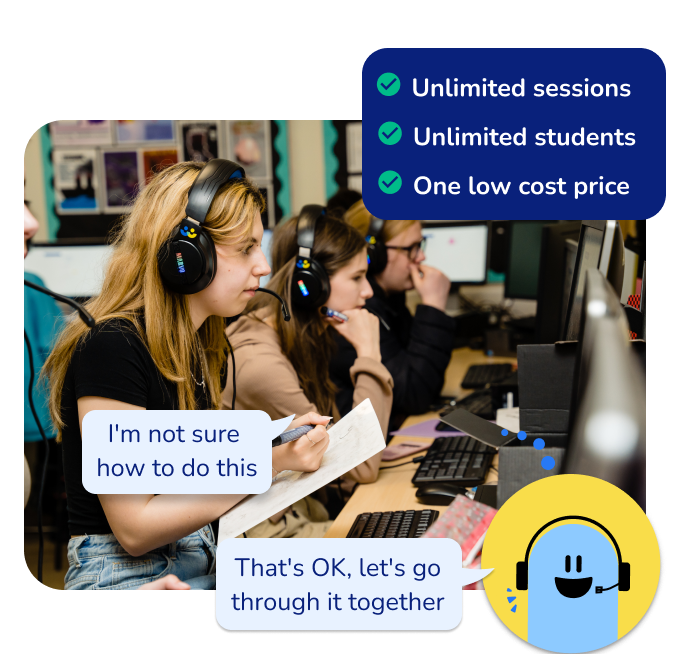
Unlimited GCSE maths tutoring with Skye, the voice-based AI maths tutor.
Built on the same principles, pedagogy and curriculum as our traditional tutoring but with more flexibility, reach and lower cost.
Help your GCSE students achieve their target grade with Skye’s one to one maths tutoring.
Watch Skye in actionDistributed practice and interleaved practice
Distributed practice is now common in classrooms as a teaching tool, but the principles also apply to revision. Several short revision sessions are much more effective than one long cramming session. If allocating two or three hours of revision per week to maths, it is more effective to spread this time out in 20-30 minute chunks over the week (along with different subjects), than to have one night with a three-hour Maths study session, followed by three hours the next night on English Literature.
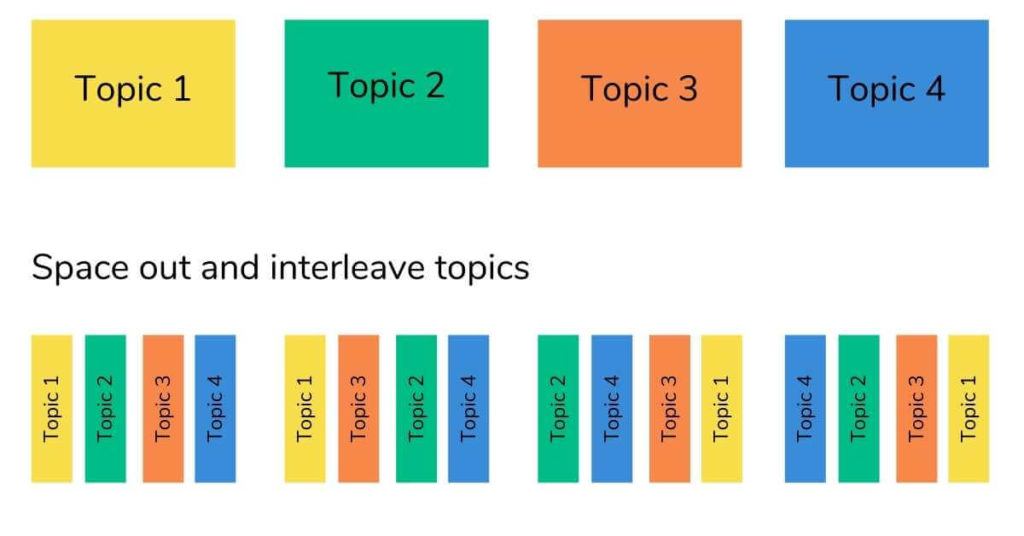
Dunlosky’s article suggests that interleaving practice also shows promise as a study strategy – so a student might cover two or three distinct topics in each revision session, as opposed to spending a whole revision session on one topic. When compared to massed practice (completing several of the same question type in a row), interleaving results in slower initial learning but far superior retention.
Read more:
Using exam papers to revise for GCSE
Working through exam papers is a common strategy used for revision, and feeds nicely into the idea of interleaved practice; GCSE papers contain a mixture of topics and difficulties, as opposed to an exercise focusing on one skill. Repeating exam papers in timed conditions is also a great way to improve exam techniques and time management for the real thing.
Focus on topics
Students often want to know how to focus their revision – which topics they should focus on, and which they can skim over. Attempting exam papers also allows students to identify these weaker areas, so they don’t just end up working on the stuff they’re already good at. Some students may need support with identifying these areas, which can be done through usual feedback channels. For a whole class approach, I’ve blogged previously about Foundation GCSE maths topics and Higher maths topics to focus on, which may be a helpful starting point.
Past papers in class
At a previous school, we supplied all Year 11s with a folder of practice papers and past papers towards the start of the autumn term. We included an index card in the front for students to record their result and any notes, such as topics they’d struggled with on that particular paper for targeted revision. We indicated which papers would be completed in class (either as part of a revision lesson or for low-stakes assessment opportunities), and which they could complete to support their own revision.
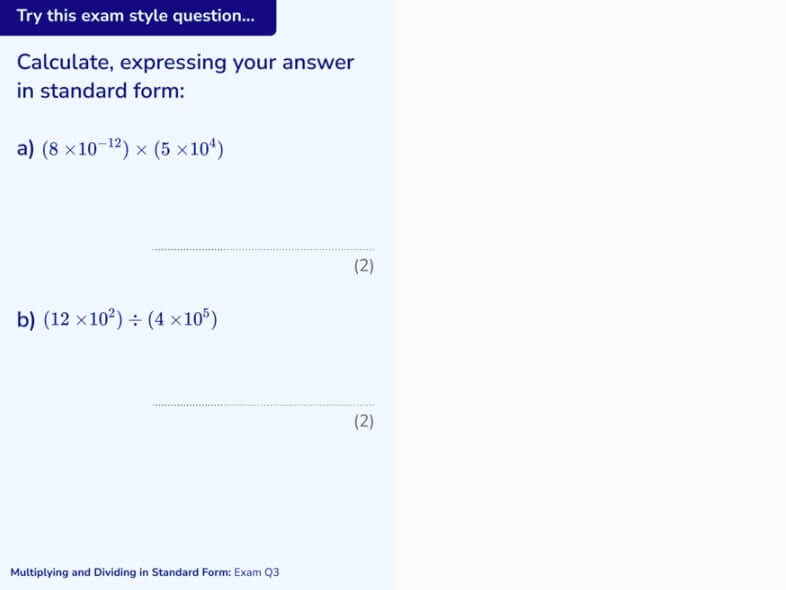
slide includes exam style questions indicating marks
This method had a few big advantages:
- It helped students to keep their papers organised and not end up with a big stack flapping around in the back of their exercise books;
- It was easy to refer to exam questions while teaching and engage students in spotting patterns across papers – for example, if they’d struggled on a certain type of question on a formal mock, we could then go through the revision papers to try and find similar questions, then work on them as a class;
- When students attended revision sessions or worked independently, they could refer to the index card to check which topics should be prioritised;
- Finally, more of an organisational advantage for us, but it meant no tying up the photocopier doing class sets of exam papers once we’d got the folders sorted!
See also: GCSE maths predicted papers
Mark schemes
Clearly there’s a slight issue with the availability of mark schemes and worked video solutions to exam questions online. Rather than ban students from using these, we should encourage responsible use as a last resort if they are completely stuck. They can note on their papers or revision work when they have used a mark scheme or video to help.
Finally on the subject of GCSE exam papers, make sure that students know which exam board they’re sitting, and which tier – and if they’re purchasing revision guides, check they’ve got the right one!
Read more:
Less effective techniques when revising for GCSE
It’s also important that we make students aware that many prevalent GCSE revision tips aren’t particularly effective. Techniques like rewriting revision notes or copying from a revision guide, colour coding, and making posters can be enjoyable, but generally they aren’t the most effective use of revision time.
Dunlosky notes that highlighting isn’t a bad technique when students meet concepts for the first time – so highlighting important formulae in class notes is a good idea – but going through a revision guide with a highlighter isn’t a great use of study time.
Learning styles are another ineffective technique – the old visual/auditory/kinaesthetic model, which now has been largely discredited, still appears on some revision tips lists. This is not to say that some of the suggested strategies (listening to podcasts for the ‘auditory learner’, for example) aren’t useful, but, if they are useful, they will be intrinsically useful to all students, not a subset identified as having a particular learning style.
The crucial point to get across to students is to make sure they’re doing maths when they’re revising. For students lower down the school, good study habits can be encouraged by discussing these ideas with them at internal assessment points, and we can use the opportunity to suggest alternative strategies to try next time for those students who ‘spent all week revising’ but still didn’t achieve as expected.
For GCSE students, it can be useful to set aside a portion of class time at the start of the year, or new term, to summarise revision techniques and share some of the research ideas.
A suggested approach to GCSE revision
To help students plan their revision, I’d suggest starting with a list of 5-6 topics, preferably identified by the student from past papers, but with teacher guidance if necessary. If your school buys into any online services offering diagnostic testing, this can be another way to come up with a shortlist of key topics.
Third Space Learning’s online GCSE tuition uses diagnostic testing to help students identify the areas that they need to improve on. Using the information from the diagnostic questions, each student’s programme is then tailored specifically to them, to fill in the gaps in their individual learning and help to prepare them for the GCSE Maths exam.
Starting revision
Offline, once the student has the list of topics, get them to plan a revision cycle of these topics. So they might do 10 minutes of Pythagoras and 10 minutes of simultaneous equations on Monday, then 10 minutes of index laws, followed by 10 minutes of surds on Tuesday, and so on, varying the topics throughout the week.
At this stage of initial revision, this would consist of reading class notes or relevant revision guide notes, followed by attempting to work through step-by-step examples from memory. It’s a good idea to incorporate regular flashcard review to ensure key formulae are well memorised, perhaps with a weekly slot.
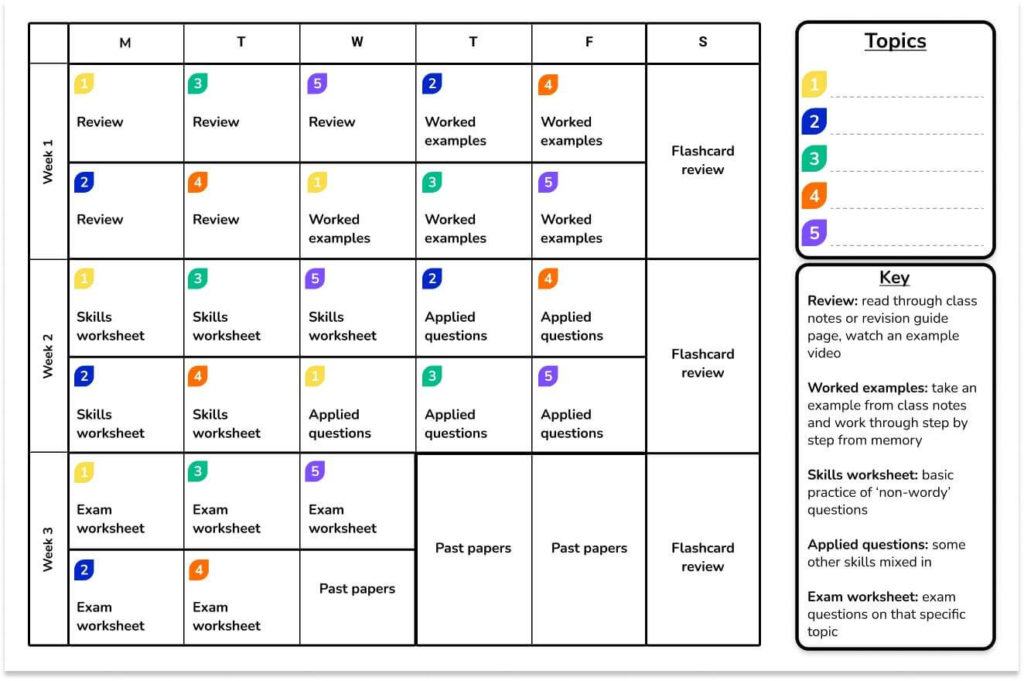
When the student feels confident in their understanding, the next iteration of a topic could be working through a topic-based worksheet – Third Space Learning offers a wide range of free topic-based GCSE maths worksheets with skills practice, applied questions and exam question. Our collection of GCSE revision mats are also a great resource for preparing for GCSE maths exams.
Once students are confident with the topic, they could use their folder of past papers and find similar exam questions to attempt – or, even better, find questions that they have previously answered incorrectly to correct.
Clearly, timings are flexible depending on students’ needs – for example, some might prefer to work with 15 or 20 minute slots, or have commitments on particular nights of the week. This is a suggested programme to start with, and potentially adapt to individual needs.
See also: GCSE Maths Questions
Closer to the exam
Around February half term I’d encourage students to be using their revision time to complete a practice paper every week – this can be tied into review in class. At this stage in their revision, hopefully they have reviewed all necessary topics and can have a good attempt at a complete paper independently.
At this stage, we should be encouraging students to review their own work using mark schemes, or accessing tutorials/walkthroughs on YouTube if they are completely stuck. As they complete papers, they will continue to identify topics (hopefully now fewer!) which are sticking points, which could be addressed in another cycle of revision as described above.
How to revise for GCSE FAQs
I have included my answers to a few revision FAQs from students below. This could be a good jumping off point to share with your students to begin a discussion about effective maths revision.
How many hours should you revise for GCSE?
Unfortunately there is no magic answer! What’s more important than racking up a certain number of minutes or hours is spacing out revision time throughout the week or month. It is much more effective to spend 20 minutes a night, three times a week, than to try and study for a full hour on one night.
Regular study breaks are important. Evidence shows that we can concentrate on a task for about 20-25 minutes before losing focus and becoming unproductive, so a good rhythm is to study for that length of time, then have a 5 minute break to stretch, get a drink or a snack, and so on. It’s important to avoid anything too distracting like watching TV or procrastinating by scrolling social media!
When should you start to revise for GCSE?
Ideally from the autumn term of Year 11, the sooner the better! Revising and revisiting concepts regularly is the most effective way of getting them stored into long-term memory, ready to be accessed in an exam.
A revision timetable can really help to organise and plan workload. Start by marking key GCSE dates, such as mock and final exams. Commit to a manageable amount of time each night – such as two 20 minute chunks broken up with a 5 minute break (that’s about an hour). If an hour feels like too much to start with and is demoralising, start with 20 minutes each night. Work out when to study each subject, and spread them out fairly across the timetable. Make sure that the least favourite subjects aren’t neglected! Try our revision time table template.
Which subjects should you revise for GCSE?
Everything that’s on the Maths syllabus could appear in the exam – so it’s important to revise thoroughly. Don’t assume that because something was on the exam paper last year, it won’t appear again this year.
Foundation students need to have a really good grasp of number, arithmetic, proportional reasoning, geometry and measures work, as this is where most of the marks are. Higher students need all of this, plus real confidence with algebra skills, and applying multiple skills in the same question when problem solving.
What are the best revision techniques for GCSE?
The best revision techniques are:
- Testing from memory, either by covering up notes and writing down key points, working through examples, or using flash cards;
- Using exam papers to identify areas or topics for improvement, working through papers independently and checking answers using the mark scheme;
- When working on practice questions, don’t just answer 20 of the same question – try and vary it up with a mixed set of problems incorporating two or three different topics;
- Lots of opportunities for doing maths rather than just reading or looking at notes.
What should you do when you have finished revising for GCSE?
Don’t finish revising for GCSE Maths until the end of the third paper! Use the previous paper(s) to direct revision topics – for example, if a topic has come up on Paper 1 and Paper 2, it is unlikely (but not impossible!) for it to come up again on Paper 3.
Once the Maths GCSE exams are over, it is important to continue to practise relevant skills so they are not lost. Topics like statistics are useful for Sociology or Psychology, and applications of algebra and graph interpretations are useful for Chemistry and Physics.
If the plan is to continue studying Maths at A Level, it’s absolutely crucial that maths practice is continued through the period after exams and the extended summer holiday of Year 11. Many schools will offer work to complete or look out for Step Up To A Level Maths free transition package from CIMT.
DO YOU HAVE STUDENTS WHO NEED MORE SUPPORT IN MATHS?
Skye – our AI maths tutor built by teachers – gives students personalised one-to-one lessons that address learning gaps and build confidence.
Since 2013 we’ve taught over 2 million hours of maths lessons to more than 170,000 students to help them become fluent, able mathematicians.
Explore our AI maths tutoring or find out how our GCSE maths tutoring programmes could support students in your school.
